Jul 2016
Comedy has its coming out party at 1992 Democratic convention
28/07/16 09:07
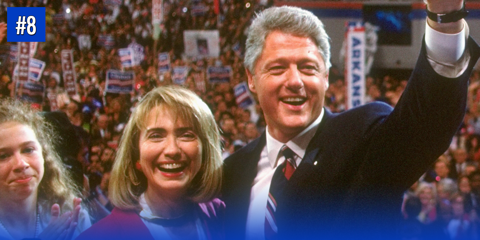
Note to readers: Our last in a series of national political convention look-backs journeys to 1992, when comedy made its first major impact on these quadrennial gatherings. The Democrats nominated Bill Clinton for the first time in a pre-ordained exercise in choreographed showmanship. Comedians responded by ridiculing the process on a nightly basis while old-line journalists said they really couldn’t be blamed. This article was originally published on July 16, 1992.
By ED BARK
@unclebarkycom on Twitter
NEW YORK -- It’s a convention that has seen television screens turned into fun house mirrors.
A convention where the Comedy Central cable network has landed NBC anchor Tom Brokaw, Illinois Sen. Paul Simon and an array of other serious-minded politicos and media stars for its nightly two hours of coverage. And where the ubiquitous Brokaw concludes his workdays by joining Jay Leno to twit the Democrats on The Tonight Show.
Short of news and long on made-for-TV theatrics, the convention is being punched silly, often to the delight of media types who used to take these matters much more seriously.
“The problem is, this is a Super Bowl, but you know the final score,” said CNN’s Larry King, who was a guest on Comedy Central on Monday night. “I wonder what would happen if a Martian came down. What would he watch -- Comedy Central or CNN?”
Comedy Central’s Indecision ’92, anchored by Saturday Night Live’s Al Franken, has included:
***Nightly discourses on the “Don’t Know” factor by American Enterprise Institute pollster Norman Ornstein, who also dressed up as a pilgrim Tuesday night to debate the president of the Home Shopping Channel.
***Comedian Joy Behar’s live convention-site interviews with King, the Rev. Al Sharpton, former Texas Agriculture Commissioner Jim Hightower and McLaughlin Report host John McLaughlin, who was asked whether he wears women’s underwear.
*** Crossfire co-host Michael Kinsley’s moderating of a panel of comic impressionists.
***Republican image-maker Roger Ailes’ attempts to superimpose Bill Clinton’s head on a chicken during an interview with Franken.
Veteran NBC reporter-commentator John Chancellor, who was forcibly ejected by security guards during the 1964 Republican National Convention, says that today’s “pastel pageants of patriotism” are getting the lampooning they deserve.
“I do think that taking the news out of the convention has brought all of this on,” Chancellor said. “If the parties want to emphasize the trivial aspects, then they’re asking for it.”
Chancellor, who is retiring from NBC at the end of this year, said he “roared with laughter” Wednesday morning after reading that the Fox movie Revenge of the Nerds III had higher ratings than the convention coverage on NBC, ABC or CBS.
He said he hasn’t gotten a chance to watch Brokaw’s appearances on Tonight, “but I understand he’s been very funny.”
Brokaw’s Tuesday night Tonight schtick erased the lines between news and entertainment.
“Reporting” from NBC’s Madison Square Garden skybox, he held up a bogus New York Times front page headlining some decidedly odd political developments. Earlier, Comedy Central floor correspondent Buck Henry had used the same false-fronted Times while Brokaw was wearing his serious newsman’s hat as co-anchor of the combined NBC-PBS convention coverage.
“Some stunning political news,” Brokaw told Leno. The Times’ top story, he revealed, was Ross Perot’s decision to pick Oprah Winfrey as his running mate.
Leno rejoined, “It’s comforting to know that while the Democratic convention is going on -- which could change the fate of the nation -- the head anchorman is writing comedy bits for The Tonight Show.”
While discussing speculation that Virginia Gov. Douglas Wilder was considering running with Perot, Brokaw cracked, “It might turn out that Wilder is Oprah Winfrey in drag.”
In an interview, Brokaw said that he wouldn’t be moonlighting on Tonight if the Democrats were holding more than an orchestrated pep rally for the fall campaign.
“This is a buttoned-up convention,” he said. “We all know what’s gonna happen before we get there.
“What we have here is kind of a yeasty situation in which the party is trying to redefine itself . . . My earliest memories of political coverage are Chet Huntley and David Brinkley, and David’s wonderful kind of droll observations of what was going on. So I was weaned on the attitude that it’s serious business, but not to take yourself too seriously.”
Brinkley, who is co-anchoring ABC’s convention coverage, had said he is “too busy” to be interviewed, a network publicist said. Party officials did not return calls for comment.
Other network executives say the convention still deserves to be treated as serious business. But they don’t find fault with Brokaw’s tightrope walk between the news division’s “Decision ’92” coverage and The Tonight Show.
“If some of the folks want to have a little fun at times, it seems harmless to me. It’s a zapper world we live in today, and viewers can drift or shuttle quickly from channel to channel,” said CNN vice president Ed Turner, whose network is spending $2.4 million covering the convention. “But I think they’re all smart enough to discern the difference between news and comedy. It just doesn’t trouble me.”
Clinton advisor Harry Thomason, who with his wife Linda Bloodworth-Thomason produces CBS’ Designing Women and Evening Shade, said he isn’t particularly worried about the Democrats being portrayed as buffoons on some channels.
“I even agree that the Comedy Central thing is a good idea if it gets young people to watch,” he said. “They’ll be poking fun at us, but so what?”
Email comments or questions to: unclebarky@verizon.net
Fox News Channel pins down the donkey at 2004 Democratic convention
27/07/16 10:26
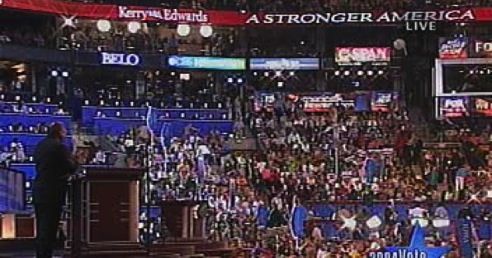
Note to readers: In this seventh in a series of look-backs at past national political conventions, it’s Fox News Channel arriving unbowed at the 2004 Democratic gathering in Boston. This article originally was published on July 26, 2004.
By ED BARK
@unclebarkycom on Twitter
BOSTON -- Fox News Channel again finds itself in the belly of the beast, namely the donkey-themed Democratic Party’s quadrennial national convention.
It’s otherwise a different story. The “Fair and Balanced” network saunters into town as a solid No. 1 in the cable news Nielsen ratings. It must be doing something right, and not necessarily always right of center. Former ABC News stalwart Brit Hume, who joined Fox news at its inception in 1996, said he’s not looking for conservative angles, just new ones.
“It’s not so much addressing an imbalance in coverage, but just doing it in a different way,” he said after his regular stint as a panelist on Fox News Sunday. “Get it right and be different. It’s a huge element of what we do. It’s what I think our viewers appreciate.”
Four summers ago, Fox enjoyed a ratings surge during the Republican convention but remained well behind front-running CNN. At the subsequent Democratic gathering, though, Fox fell with a thud into third place in the cable news wars, even trailing ratings-starved MSNBC. It cemented a prevailing perception that Fox and its viewers greatly prefer the company of elephants.
“It’s possible that CNN will win the ratings here. I wouldn’t consider it all unlikely,” Hume said. “If we don’t win here, people will say, ‘You see, it’s a right-wing network.’ But if we go to New York and win the Republican convention, will people say the same thing about CNN that they’d say about us? I wonder.”
At a production meeting earlier Sunday morning, Hume also wondered aloud whether Fox should devote any on-air attention to CNN’s newest wrinkle, a convention floor anchor platform that might be blocking the view of several state delegations.
“The question is whether CNN’s little floor stage is worth a . . . well, it’s a hoot,” Hume said.
Meanwhile, at least two high-level Democrats played ball with Fox on Sunday morning. New Mexico governor and convention chairman Bill Richardson and Pennsylvania Gov. Ed Rendell parried with Fox News Sunday host Chris Wallace, who told them “Great job” afterward. There was an easy camaraderie among the three, with Wallace jokingly telling Rendell, “I can ask the meanest question I want, and you just go right to your talking points.”
Wallace left ABC News late last year to take over Fox News Sunday from Tony Snow. He quickly landed Democratic guests who previously had shunned the network, most notably Hillary Rodham Clinton. National Public Radio commentator Juan Williams, who regularly supplies a left-of-center voice on the program, said he feels less pigeonholed at Fox than he did as a co-host of CNN’s Crossfire.
“At CNN they’d say, ‘You really have to hold up the left portion, and you have to be the black guy.’ Here it’s more intellectually free. They have that strong, conservative position anchored, so I’m the variable. Sometimes I even agree with Brit.”
Still, Fox enters the Democratic convention in the crosshairs of Outfoxed: Rupert Murdoch’s War on Journalism. Co-produced by the openly liberal MoveOn.org, the new documentary film features former Fox news personnel saying they regularly received Republican marching orders from their bosses.
“I’ve seen the film,” Wallace said. “It’s about as biased and intellectually dishonest as Michael Moore’s Fahrenheit: 9/11, but without any of the sense of humor or productions qualities. It doesn’t bother me because it’s so foreign and unrepresentative of the place I work. Has it made it more difficult to get Democrats on the show? Not a bit.”
Hume said that Fox is fair game for envious enemies.
“We had a choice,” he said. “We could be liked and accepted and popular with our competitors, or we could be No. 1. We couldn’t be both.”
Email comments or questions to: unclebarky@verizon.net
Eleanor Mondale checks out the Republicans at 1996 convo in San Diego
26/07/16 12:30
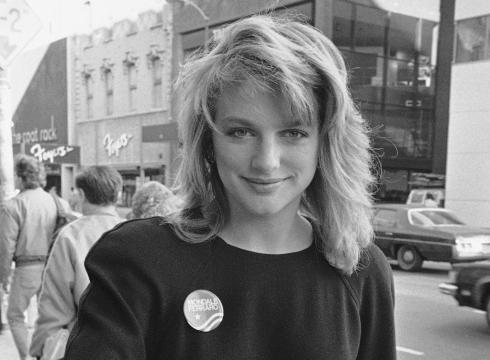
Note to readers: In this sixth reprise of past convention stories, we return to San Diego, 1996, where Eleanor Mondale bounced to and fro as a reporter for the E! cable network. The daughter of 1984 Democratic presidential nominee Walter Mondale was trying her hand at covering the Republicans for the first time. She died in September 2011 at the all-too-early age of 51, felled by brain cancer. This article was originally published on Aug. 16, 1996.
By ED BARK
@unclebarkycom on Twitter
SAN DIEGO -- Virtually sleepless in San Diego, a worse-for-wear Eleanor Mondale drove to a quick stop, tossed a cigarette butt out the window and tried to rouse herself late Thursday morning.
Twenty-five minutes late for an interview, she wore a gray t-shirt, jeans, blue-tinted sunglasses and a look of near-death accented by expansive yawns. The daughter of Walter Mondale -- former vice president and 1984 Democratic presidential nominee -- is attending her fourth national political convention and first Republican one. “I get to see how the other half lives,” she said.
Not for long, though. Ms. Mondale arrived in San Diego early Tuesday evening as an entertainment reporter for the E! cable channel’s E! News Daily. She went directly to a Planet Hollywood party to interview host Charlton Heston and guest Robert Conrad. Crashing at midnight, Ms. Mondale was up again at 3 a.m. to be a guest on Good Morning America, which tapes at 5 a.m. West Coast time. She spent the rest of the day and night editing the Heston piece and interviewing actor Alec Baldwin, whose Creative Coalition has sponsored two forums on election issues. Back in bed by 2 a.m. Thursday, she headed back to Los Angeles 10 hours later. Hey, it’s a living.
Ms. Mondale had one particularly surreal experience in San Diego. While talking to humorist Al Franken on the convention floor, she had a sudden impulse to call her parents back home in Minnesota.
“It was really cool!” she exclaimed. “They just happened to be home. Dad had just had a tooth pulled, so he wasn’t that communicative. But he was excited to hear from me. They’re just really proud of my being able to do this.”
Ms. Mondale attended the 1976, ’80 and ’84 conventions as the child of a candidate. Her father, now ambassador to Japan, opposed Bob Dole in 1976 when both were running for vice president. Ms. Mondale said she first met Dole when her father debated him in Houston 20 years ago.
“We put in a request to interview him (Dole), and I don’t know why he wouldn’t do it,” she said.
As candidates in a media maelstrom, both her father and Dole admittedly have struggled to adapt to the television age.
“Isn’t that funny?” asked the TV-savvy Ms. Mondale, who broke into the biz as an entertainment reporter for WCCO-TV in Minneapolis. “My father likes being in office. He doesn’t necessarily like the campaigning part of it because of having to be conscious of the television cameras. The media were a source of discomfort for him, and it seems that Dole is sort of from the same school my Dad was. When they grew up, America was different.”
And now, so is she.
Email comments or questions to: unclebarky@verizon.net
Brokaw chafes at outset of his last convention as NBC's lead anchor
25/07/16 15:17
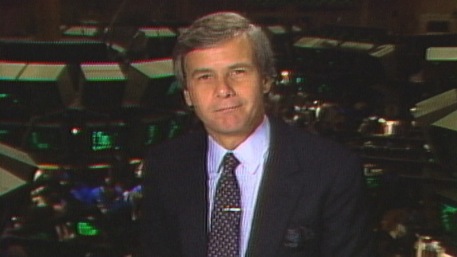
Note to readers: As the 2016 National Democratic Convention gets underway in Philadelphia, this is the fifth in a series of reprises from past such gatherings I’ve covered on-site. Up-close this time is NBC anchor Tom Brokaw, who wasn’t terribly happy with the latest course of events when we talked on the eve of the 2004 Republican National Convention in New York. The article originally was published on Aug. 30, 2004.
By ED BARK
NEW YORK -- Tom Brokaw’s last national political convention as NBC’s lead anchor finds him fed up with choreographers from both parties and angry about the Commission on Presidential Debates’ recent snub of his network.
His measured but firm responses came after a Sunday morning appearance on Meet the Press, where he and moderator Tim Russert closed the program by chewing on their favorite appetizer -- presidential politics.
Brokaw, 64 and retiring from the NBC Nightly News on Dec. 1, has a convention resume dating to the raucous 1968 Democratic gathering in Chicago. That makes this his 20th go-around and the last before he bequeaths Nightly News to Brian Williams.
“In those days, conventions were conventions,” Brokaw said in a one-on-one interview. “Delegates were not implanted with a chip and told to say only one thing when they got on the floor.”
He’s still miffed about the waylaying of his planned interview with Arizona Sen. John McCain, who had agreed to appear on Monday’s Nightly News. Convention organizers and McCain’s staff reneged after learning that the senator also had agreed to be on NBC during Wednesday’s prime-time coverage. NBC, CBS and ABC each could have McCain once, but not twice, Brokaw said he was told.
“I suppose I’m going to be a little nostalgic at the end of this convention. But what’s so frustrating to me is that enterprise and the entrepreneurial spirit just don’t count anymore. Everything is put through such a very tight filter by the party. So the vitality is drained from it, and the role of the journalist is more as a kind of concierge saying, ‘If you make a turn over here to the right, you’ll be hearing this speaker.’ It’d be harder for me to walk away if I could go out there and get who I wanted when I wanted him without having to go through the politburo of the Republican or Democratic party.”
Brokaw views the upcoming presidential and vice presidential debates as pivotal, however. So he’s still boiling over the commission’s selection of CBS’ Bob Schieffer, ABC’s Charles Gibson and PBS’ Jim Lehrer as the presidential debate moderators, and PBS’ Gwen Ifil for the lone vice-presidential face-off.
“It’s not personal pique,” Brokaw said. “Obviously I would have liked to have done one of the debates. But my big outrage is that they excluded our entire network. And I just think that’s unconscionable. Even our competitors say, ‘What? They left out NBC?’ Tim (Russert) has the No. 1-rated Sunday show, I’ve got the No. 1-rated evening news broadcast, and we’ve done more debates than any other news division in the course of the past year.”
The commission has declined to comment on its choices, other than executive director Janet Brown telling The New York Times that a star anchor might “overshadow” a debate.
Brokaw, who has moderated numerous primary season debates but never a post-convention one, said he’s insulted by that rationale.
“It’s not like I haven’t done them before. And when I have, I’m happy to say there’s been very little criticism about the anchor trying to get himself in the way. I hope at this stage of my career I have a certain standing as a political reporter who knows what the issues are and tries to generate a dialogue about them.”
After leaving Nightly News, Brokaw plans to write more books, contribute periodic documentaries and otherwise live a life unfettered by urgent phone calls to report for duty.
“What I will not miss is the uneasy feeling that I’m missing something,” Brokaw said. “I’ve been doing this for a long time. I’m ready to get de-coupled.”
Brokaw was preceded on Sunday’s Meet the Press by Sen. Hillary Rodham Clinton of New York, who exchanged pleasantries with previous guest Rudolph Giuliani before a Fox reporter briefly intercepted her.
Mrs. Clinton declined to commit when asked if she’d appear on Fox News Channel’s highest-rated program, The O’Reilly Factor.
“Is there anything we can do to make that happen?” the reporter pressed. “We’ll see,” she said while exiting with her entourage.
Later Sunday, C-SPAN’s continuous live coverage of a protest through central Manhattan was spiced with repeated chants of “Down with Fox” and “Fox News Sucks.” The “fair and balanced” network’s corporate offices and studios are located along the protest route.
Email comments or questions to: unclebarky@verizon.net
The 1984 Republican convention in Dallas: "Our job is to show up and see if anyone commits news"
21/07/16 11:25
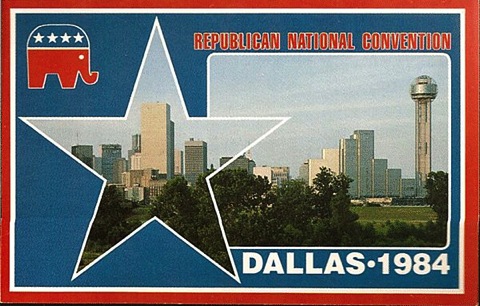
Note to readers: Your friendly content provider’s first of 10 national political conventions was in 1984, when the Ronald Reagan-led Republicans took their show to Dallas to re-coronate him. ABC, CBS and NBC turned out in force while the still fledgling CNN tried to make its first big showing. Here’s what many of the day’s heavy-hitters said on convention eve before temperatures spiked to 106 degrees for opening day. This article originally was published on Aug. 19, 1984.
By ED BARK
@unclebarkycom on Twitter
Pile the imposing portable anchor booths atop one another and they stand 11 stories high -- three apiece for ABC, CBS and NBC, and two for CNN.
Can the networks possibly find that many big stories at this week’s four-day Republican National Convention in Dallas? “You want to know how we’re going to make it interesting,” volunteered Reuven Frank, a 34-year veteran of NBC News and executive producer of the network’s convention coverage. “I don’t think that’s our job. I’m not sure, if you’re covering a baseball game, and it’s 10 to 1 going into the eighth inning, that you make it interesting. If we find something interesting, we’ll report it.”
“Our job,” said CBS floor reporter Bob Schieffer, “is to show up and see if anyone commits news. The Republicans are charged with coming up with the plot for this thing.”
With the nominations of President Ronald Reagan and Vice President George Bush in the bank, the networks could be facing a series of thin plots and lopsided ballgames. Realizing the obvious, Republican organizers of the convention have condensed it and scheduled two-thirds of the abbreviated agenda in two-hour prime-time blocs. Some of the sleepier business will be dispensed with in two-hour morning sessions on Monday and Tuesday.
The rest of the convention schedule is an almost perfect match for the commercial networks’ coverage plans: Two hours, from 8 to 10 p.m. on Monday, Tuesday and Thursday nights. Wednesday’s nominating session, scheduled to begin a half-hour earlier, may or may not be covered in its entirety by ABC, NBC and CBS. It depends, in the words of a CBS press release, on whether the extra 30 minutes constitute “newsworthy convention activities.”
By making ready for prime-time -- and little else -- the Republicans have come up only four hours short of foisting gavel-to-gavel coverage on the commercial networks. In San Francisco, the Democrats began at 5 p.m. (CDT) the first two days, at 2 p.m. on day three and 5:30 p.m. on closing night. Consequently, more than half of the convention could be seen only on cable television’s CNN and C-SPAN, both of which will go gavel-to-gavel again in Dallas.
Still, the Democrats saved most of their big acts -- Mario Cuomo, Jesse Jackson, Gary Hart, Geraldine Ferraro, Walter Mondale -- until the commercial networks were ready for them. Even former President Jimmy Carter got into the prime-time act, although he originally wasn’t supposed to be there.
“I think the convention planners have become a lot more realistic about the news value of their convention,” said Jeff Gralnick, executive producer of ABC’s convention coverage. “They have an understanding of which end of the dog wags which end of the dog.”
“Every four years they try to orchestrate them more, and you can’t blame them for that,” Schieffer said. “Every day, in every town in the United States, people are trying to manipulate the news media. There’s nothing immoral about that.”
Some critics contend that the three commercial networks are morally obligated to carry a national convention’s activities in full, no matter what the agenda or the Nielsen ratings. Whatever the excitement level, conventions are quadrennial reaffirmations of the democratic process.
CBS anchor Dan Rather was unable to convince his bosses that coverage should start immediately after the early evening newscasts. He also wanted some live reports of daytime sessions.
I don’t think they’d (CBS management) want me in this job if I didn’t feel that way about it,” Rather said. “But in this particular year, it got very difficult to champion that cause. When you have a year in which both parties have settled on their nominees, it makes it hard to take my argument much beyond where I took it. I gave it my best shot. The decision went the other way and I’m comfortable with it.”
Nielsen ratings were expectedly low for the commercial networks’ convention coverage in San Francisco. Only 44 percent of TV viewers tuned in to watch the Democrats on CBS, ABC and NBC. In comparison, ABC’s prime-time Olympics coverage drew 45 percent of the viewing audience during the week ending Aug. 5.
“If we were in the ratings business, we wouldn’t be putting conventions on the air, because the political process is not a big ratings-getter,” Gralnick said. “There’s been erosion in the number of people watching political coverage, just as there’s been an erosion in the number of people who vote. I think both are wrong.”
On CNN, though, the Democratic convention unexpectedly drew substantially larger audiences than the all-news network’s regularly scheduled programs. Robert Furnad, CNN’s political news director, said advertisers therefore are paying four times as much for spots during the Republican convention.
“The commercial time was sold just like that,” Furnad said. “Which helps, because we lost our butts on the other one, in terms of finances.”
In terms of excitement, said NBC’s Frank, the Dallas GOP convention is comparable to the 1956 Republican gathering at which Dwight Eisenhower and Richard Nixon were renominated.
“We didn’t know how to do it as well as we do now,” he recalled. “We actually reported one of our reporters being instructed in the hula by one of the delegates. I mean, there was nothin’ going on. That’s one of the things that happens with gavel-to-gavel. Not doing gavel-to-gavel this time will help us.”
The conventions of the 1950s, and television’s coverage of them, seem prehistoric now. Gralnick says that today’s political conventions have become “dying dinosaurs” with little purpose other than to ratify decisions made by voters during the presidential primary season.
“Some conventions are more interesting than others, but that doesn’t make them dinosaurs,” Rather countered. “What we’re all taught, by no later than the seventh grade, is that we are committed to the idea and the ideal that people choose their own leaders. The conventions are an integral part of that system, and we forget that or make light of that at our peril.
“Unfortunately, we’ve all gotten a little afraid to talk in those terms. We believe it, we know it, but it’s become fashionable to say it doesn’t amount to anything. If that sounds like someone’s Fourth of July speech, then so be it. I believe it.”
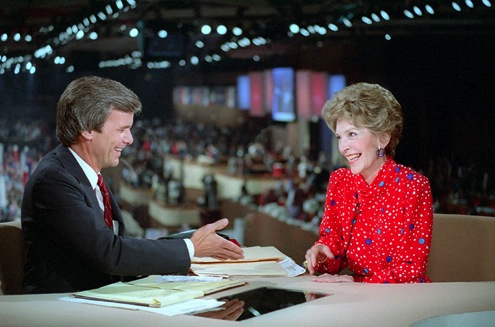
Tom Brokaw, anchor of NBC’s convention coverage, said he doesn’t expect a “three-ring, go-to-hell, knock-down, drag-out circus” in Dallas. But a little democracy in action goes a long way with him, too.
“I don’t think you can just turn on the cameras and microphones and say this is a civics lesson,” Brokaw said. “But, in the course of our coverage, we can in fact provide an important civics lesson for the country. That doesn’t mean that we take on the role of instructors of Americana. But there is nothing more reflective or representative of the body politic in America than a national political convention. I think it’s important to have this kind of electronic forum available.”
Anchors with hands over hearts still have time to fill, though. Brokaw, Rather, ABC’s Peter Jennings and CNN’s Don Farmer all say they are convinced the Republicans will offer some real meat amid the filler. Would a self-respecting anchor say otherwise, though?
“Certainly, if the Republicans put on nothing but a steady steam of aging white men in gray suits talking about inflation, it’s not going to be a very interesting convention,” Rather said. “But I don’t think that will happen.”
Rather thinks that the party’s divided position on taxes, for one, could be an interesting, significant story.
Brokaw says NBC will examine Reagan’s presidency and the GOP’s relevance to women and minorities.
“I think it’s going to be very obviously a choreographed celebration of Ronald Reagan’s four years in office,” he said. “Our obligation is to provide some examination of that. We see it as an opportunity to raise before a wider audience many of the issues that are important to the country.”
The tax increase/budget deficit debate between Reagan and Democratic challenger Walter Mondale undoubtedly will continue at the convention. That doesn’t mean an anchor has to like it.
“It’s one of the great silly issues of our day,” said Farmer, one of CNN’s three convention anchors. “You know, such garbage. Every credible economist and economic journalist I’ve read has said that of course we’ll have to raise taxes. No question about it.
“I think our commentary and analysis will have less to do with the happenings at this particular convention and have more to do with the campaign,” he added. “Because Mondale has been so vocal, he’s given everybody a quick, and not very sneaky, preview of some of the themes of his campaign.”
Of the anchors, producers and reporters interviewed, only ABC’s Jennings thought that Dallas, and Texas, might get heavier media exposure than San Francisco did.
“I think Texas in general and Dallas will get quite a lot of coverage,” he said, “because they are seen in the president’s mind as being bastions of Republican strength.”
NBC’s Frank doesn’t think Dallas will be much of a story.
“The thing I have found about conventions,” he said, “is that they become sealed universes. Nothing outside seems to matter. We thought that San Francisco would be very important, and it wasn’t. The importance of Dallas, when it was picked as a convention site, was a big story. But once Monday night rolls around, it could just as well be on the moon.”
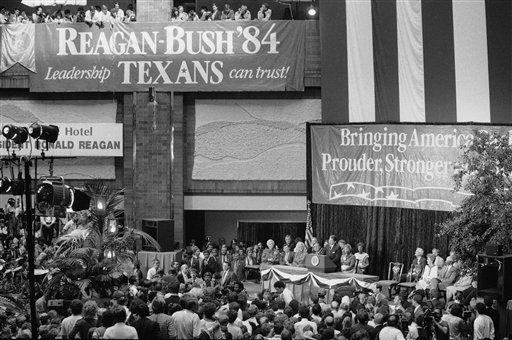
CNN plans to have stories on Billy Bob’s Texas nightclub, convention security and the King Ranch. All the networks will cover any particularly picturesque demonstrations. There was this story idea, too, on an assignment sheet posted in one of CNN’s work areas at the Dallas Convention Center.
“The Anatole may be the brick and glass equivalent of Sister Boom-Boom from San Francisco. We shall take a look at what will be the president’s home during his stay here.”
“We’re proud to say that we’re not doing anything on the Dallas television program,” Farmer said. “And I don’t think we’re doing anything on the assassination route. I’m not saying we won’t at some point allude to it, but it’s certainly not something we’re going to spend a lot of time on.”
Schieffer and Rather, both native Texans, have homier feelings about the area they grew up in.
“Dallas is just like anybody else who’s about to host a party,” Schieffer said. “There’s going to be a certain amount of nervousness, I’m sure. I think everybody wishes Dallas well on this thing. I sure do. It’s tough to put on one of these things.”
“So far, Dallas has gotten an absolute Niagra of good reports from the press,” Rather said. “Reporters I’ve talked to are surprised by how much the area has grown and how much more sophisticated, how much less provincial the place seems to them. Dallas has won a lot of people over. It seems to have a better sense of humor about itself now than it once had. And that’s helped enormously.”
The networks, like Dallas and San Francisco before it, will be examined for warts and beauty marks during convention week. Some of the sharpest criticism of the Democratic convention coverage came from Thomas Griffith in the Time magazine “Newswatch” column.
“The arrogance of television,” Griffith wrote, “is its assumption that its own maunderings are more interesting than what is being said on the platform.”
Jennings strongly objects.
“I’m very self-conscious about that kind of thing,” he said. “I never think it’s particularly my role to blow smoke or blow wind. One of the things that we did quite a lot of in San Francisco was to go back to the floor and hear from other people. I would much rather hear what is happening at the convention than to hear me or any of my colleagues sitting around analyzing it to death.”
An anchor, Jennings said, should be a “traffic cop.”
According to sources at ABC News, Jennings was infuriated when his network blew the whistle on convention coverage during a lull before Jesse Jackson’s speech. ABC cut away from its coverage, showed part of a Hart to Hart rerun, and then returned, reportedly at Jennings’ behest, to catch part of House Speaker Tip O’Neill’s warmup speech for Jackson.
Gralnick, who made the decision, still defends it.
“I haven’t lost any sleep at all about that one,” he said. “If we had a special edition of 20/20 that we cut to and then went away from, nobody would have said anything. But somehow there’s this bugaboo about entertainment programming.”
Marty Haag, news director at ABC affiliate WFAA-TV (Channel 8), termed Gralnick’s decision “horrible.”
“It’s a tacit admission that you can’t fill the time with reporters who supposedly have been with the candidates for some time,” he said. “If a local station did that, we would have been bombarded with phone calls.”
Frank, playing games with ABC, ran a synopsis on NBC of the Hart to Hart episode’s conclusion during the closing credits of that night’s convention coverage.
The Democratic convention’s other celebrated incident, from a coverage standpoint, was the denunciation of CBS floor reporter Ed Bradley by Chicago mayor Harold Washington. Bradley had tried to arrange an impromptu floor debate between Washington and Chicago alderman Edward Vrodlyak, who are bitter political enemies.
“I’m stunned at a man of your high caliber who would stoop to such a thing,” Washington told Bradley on camera. “You are one of the lowest possible individuals I have seen. How dare you call yourself a press man?”
Leaving Washington’s insult unanswered, Bradley cut away by saying, “Dan, I think you see an example of the problems that the Democratic Party has.”
During dead spots in conventions, “There’s a danger of taking a slight ripple and making it into a whirlpool,” CNN’s Farmer said. “The ‘Ed Bradley lesson’ is not lost. Ed’s a good man, but in my opinion he went too far. That’s something that I hope our people won’t do.”
CBS had left Sen. George McGovern’s podium speech for what turned out to be Bradley’s uncomfortable scene with Washington. The timing was unfortunate, Rather said, but criticism of Bradley is “an unfair rap.”
“I thought Ed handled it wonderfully. I don’t know of anybody in the business who would have handled it as well,” Rather said. “Was he trying to make something out of nothing? Absolutely not. The ill feeling between the different factions of the Democratic Party in Chicago is real. It’s not something Ed Bradley created. It’s a fact, and Bradley’s reporting brought that to the television screen.”
It is unlikely that comparable friction will be found between two Republican delegates from the same state. But there’s got to be a ripple -- or maybe even a whirlpool -- somewhere on the convention floor.
“It’s pretty hard to get this many members of a political party together at one time and not have something that’s interesting,” Schieffer said. “But if there’s no story, there’s no story. Some days you get the bear and some days the bear gets you.”
Email comments or questions to: unclebarky@verizon.net
Brinkley on the brink of calling it a day at 1996 Republican convention
20/07/16 11:20
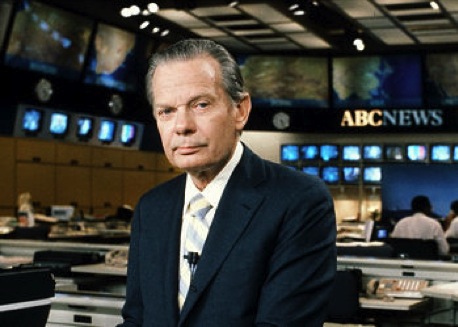
Note to readers: David Brinkley, who died in 2003 at age 82, was in his last cycle of national political conventions during the 1996 Republican gathering in San Diego. He wasn’t doing many interviews at the time, but sat still for this one. This article originally was published on Aug. 14, 1996.
By ED BARK
@unclebarkycom on Twitter
SAN DIEGO -- It will be the end of an era or two when David Brinkley stops being a fixture at national political conventions.
The ongoing Republican gathering is his 21st. The Democrats in Chicago will be his last. At age 76, it’s time for him “to do something else,” Brinkley said Tuesday from a makeshift office at the ABC News trailer compound off San Diego Bay. “I don’t know what. It’s all pretty much up in the air.”
He also will be leaving Sunday morning’s This Week with David Brinkley after 15 years. But he disputes a current TV Guide story that says he’ll stay with the program until the presidential inauguration on Jan. 20.
It could be much sooner than that, perhaps “even sometime this summer,” Brinkley said. “I don’t know precisely when it will be. I don’t know how they think they know.”
Jacket-less in a wide-striped shirt, maroon tie and navy blue suit pants, the usually press-shy TV news pioneer cordially endured an interview with a reporter who was still a grade-schooler in 1956. That’s when Brinkley, in tandem with Chet Huntley, anchored his first pair of national political conventions. The network was NBC, and the inclination was to televise every last minute the politicians had to offer. On several convention days, the soon-to-be-famous Huntley-Brinkley team began convention coverage at 9 a.m. and stayed on the air until 3 o’clock the following morning.
“The difference was that people were interested, found them exciting and tuned them in in enormous numbers because they’d never seen anything like it before,” Brinkley said. “Now they’re largely indifferent. It’s just another political show.”
Not that politicians of both parties have stopped trying to use the networks as dispensers of their modern-day infomercials. At his Tuesday morning press briefing, for instance, Republican National Committee chairman Haley Barbour griped that CBS was the only broadcast network not to carry a brief, “powerful and moving” filmed tribute to Ronald Reagan. ABC was alone in shunning a previous speech by former President George Bush.
“Both parties want the whole network given over to them hour after hour after hour,” Brinkley said. “They will not be satisfied until they return to the glory days of the past, which will never come back.”
Monday’s convention coverage on ABC lasted all of one hour, as it did on rivals NBC and CBS. Brinkley didn’t even get on the air, although that wasn’t the original intention. A taped piece of his was scrapped because of lack of time, he said. ”Several things got left out, but we’re used to that. Didn’t pay any attention to it.”
Brinkley said he didn’t watch much of ABC’s coverage Monday night. Again, his trademark, clipped manner of speaking came into play: “I had other work to do, and I was doing it.”
ABC anchor Peter Jennings said it was “quite unnatural for me” to anchor the opening night’s coverage without Brinkley, who was scheduled to join him on Tuesday night. They have covered politics together since 1983, when Jennings returned from an extended assignment overseas to replace the late Frank Reynolds as anchor of World News Tonight.
“I was very conscious that David could pretty much make or break my political re-entry,” Jennings said. “Had he sneered at my faulty knowledge, had he been in any way heavy-handed, I’d have gone right down the tubes. He did quite the opposite. He was patient and indulgent, never overbearing. As a result, our relationship has some father-son qualities to it. So for me, he’ll be a big loss.”
Brinkley recalls the demonstration-plagued 1968 Democratic convention in Chicago as “the roughest” he has covered. But the “ugliest,” he said, was the 1964 Republican convention in San Francisco, from which Barry Goldwater emerged as the nominee.
“The delegates were really hostile and threatening and ugly to us,” Brinkley said. “Threatened us with physical harm. We had to get bodyguards. And we had to sneak into the hotels and sneak out.
“Goldwater himself was a fine man. I love him. I still do. But some of his followers thought we were flat-out Communists, or so they said. It’s ridiculous, but there it is.”
Today’s charges of “media bias” are both tame and predictable in Brinkley’s view.
“We do our jobs, and win or lose, what the hell, that’s it,” he said. “We don’t worry about it.”
Email comments or questions to: unclebarky@verizon.net
Stiff-arming Stewart and The Daily Show at the 2000 Republican convention -- even with Bob Dole as a commentator
19/07/16 09:44
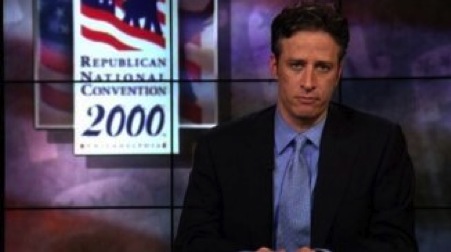
Note to readers: Your friendly content provider’s checkered past includes on-site coverage of 10 national political conventions in presidential years. In tandem with the ongoing Republican National Convention in Cleveland, here’s the second in a series of look-backs. This article was originally published on Aug. 1, 2000.
By ED BARK
@unclebarkycom on Twitter
PHILADELPHIA -- The joke is on Comedy Central this week. Courtesy of the Republican National Convention, its Indecision 2000 team is being housed on rubber-coated cots in the University of Pennsylvania’s graduate dormitory.
Anchor Jon Stewart isn’t taking it personally.
“Republicans aren’t inherently funnier than Democrats. They’re inherently more evil,” he said Monday. “Therefore it’s easier for us to poke fun. Does that make sense?”
Beginning Tuesday at 10 p.m., Stewart will preside over four convention-themed editions of Comedy Central’s flagship “news” program, The Daily Show. Look for Bob Dole, too. Hired as a commentator in January, he’ll deadpan his way through the Tuesday and Thursday editions. The 1996 Republican nominee also is scheduled to address convention delegates Tuesday night as part of a salute to World War II veterans.
Dole, who has declined to do interviews in connection with his Comedy Central activities, “has been an excellent addition to our staff,” Stewart said. “None of us knows who any of the politicians are. So oftentimes I’ll say, ‘Who’s the guy in the brown coat?’ And he’ll say to me, ‘Oh, that’d be the Speaker of the House.’ He’s very dry and very funny and, uh, no comment.”
Even with Dole aboard, “I don’t think the Republicans know who we are,” Stewart said. “Or they might not think we’re funny, which is entirely possible. There are other people in America who feel that way as well.”
Running The Daily Show is executive producer Madeleine Smithberg, who said it’s been tough getting the Republicans to play along. Sen. John McCain of Arizona has agreed to be interviewed, she said, and U.S. Rep. Mary Bono of California is booked as a Daily Show guest. No one from the George W. Bush campaign has responded yet, though. And the GOP so far hasn’t given the show any convention floor passes.
“I must say that the Republicans are really controlling this thing tightly. We really aren’t getting much cooperation,” Smithberg said. “Whereas the Democrats have already given us our own liaison for their convention.”
The Daily Show plans to retaliate on several fronts. One of the featured presentations will be a mock Bush biographical film titled “From Wealth to Riches: The Story of An American Hero.” It will detail the “adversity he has under-come,” Stewart explained.
Bush and his running mate, Dick Cheney, are a comedy team by default in Stewart’s view. It’s always that way, he said, when two politicians are thrown together on what amounts to a “blind date.”
“You pick a guy, and then the two of you have to travel around the country as bunkmates. So it’s like watching two people trying to dance together for the first time. Humor is mostly in the facade that candidates put up as they go about their business of theater and advertising.”
Bush may be a “more relatable” candidate to baby boomers than any of his opponents, Stewart said. There is, of course, a punch line coming.
“We all knew a kid in school whose dad had connections with the local authorities. A kid who always had the best weed. So there’s an affinity for him.”
The Democrats will get their turn later this month at a convention that likewise is expected to be shorn of suspense or controversy.
“We’re a fake news organization, and this is a fake news event,” Stewart said. “So I think we’re the only ones that should be here. You people should go cover actual news.”
Email comments or questions to: unclebarky@verizon.net
Bush to Dan: No interview for you
18/07/16 10:35
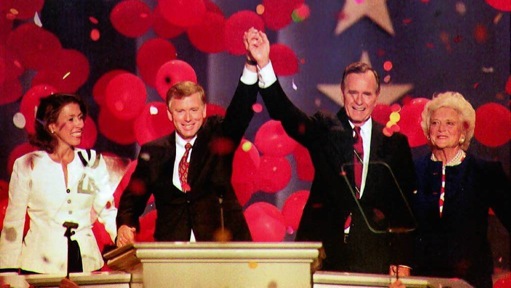
Note to readers: The four-day Republican National Convention commences on Monday, July 18th in Cleveland’s Quicken Loans Arena. Your friendly content provider has been to 10 national party gatherings over the years. For the next four days, we’re taking a look back, beginning with Dan Rather’s major difficulties at the 1992 GOP convention in Houston. This article originally was published on Aug. 20, 1992.
By ED BARK
@unclebarkycom on Twitter
HOUSTON -- Texan Dan Rather’s homecoming to Houston was supposed to be triumphant, not an occasion for President Bush to put him in the doghouse.
The veteran CBS News anchor arrived Saturday in jean jacket, jeans and high spirits. KHOU-TV, where Rather got his start more than 30 years ago, showed him gleefully hugging a Republican elephant mascot at Hobby Airport. The Houston Chronicle pictured Rather surrounded by well-wishers at a breakfast hosted by the television station. The Houston Post featured Rather with a full-beam smile in an article headlined, “Rather comes back home.”
That was all before the White House made it abundantly clear, without directly admitting it, that President Bush would not be doing an interview with Rather during GOP convention week.
“We’ve got a lot of requests, not a lot of time,” Bush campaign press secretary Torie Clark explained. “I’d say we’re working real hard to schedule everyone. Some work out, some don’t.”
Rather said Wednesday through a spokeswoman, “I really can’t talk about it.”
The president has accommodated all of the other major network news anchors, as well as at least a dozen local TV stations, since arriving in Houston on Monday.
Rather apparently is paying the price for his fabled Jan. 25, 1988, dust-up with Bush during a live interview on the CBS Evening News. The payback comes as the nation’s media are clustered en masse and hungry for fresh controversies.
“I think they should just sit down and have a beer together,” CBS This Morning co-host Harry Smith said Wednesday. “Dan probably knows a few places he could take the president.”
Absent any Q&A with Bush or his wife, Barbara, CBS scheduled a live interview with Ross Perot on Wednesday night during its convention coverage. CBS News producer Lane Venardos said the network was not playing tit-for-tat.
“It was in our plans two weeks ago,” he said.
The Rather-Perot interview probably would air about 10:35 p.m., Venardos said, while the Republicans were “futzing around before the roll call” to nominate Bush.
Why interview Perot, who ridiculed the Republican National Convention during an interview Wednesday on NBC’s Today?
“Well, he seems to be getting back in the race,” Venardos said. “Before, it was just going to be a general economic discussion, but now it will be more pointed.”
WFAA-TV (Channel 8) anchor Tracy Rowlett, who had a one-on-one interview with Bush on Tuesday, said there is “no question that they’ve (the Bush campaign) decided to throw their weight around a little bit. It’s awfully hard to snub a major network anchor the way they are doing to Rather right now. Personally, I don’t think it’s right.”
Channel 8, which received eight minutes with the president, also provided the camera coverage for the seven other one-on-one interviews the president granted Tuesday at the Houstonian Hotel.
“He’s so well-prepared,” Rowlett said. “In fact, before he came into the interview, he spent a considerable amount of time with his handlers. They were going over the events of the day and they were preparing their positions. He’s done so many of these things. He just sort of kicks in with the campaign theme of the day, regardless of what the question is.”
***Texas Sen. Phil Gramm’s moment in the limelight Tuesday night was judged a lemon by NBC News. The network ended its convention coverage while Gramm was 10 minutes away from concluding his keynote address. News president Michael Gartner made the call at 9:57 p.m., NBC spokesman Curt Block said Wednesday. At 10:04 p.m., anchor Tom Brokaw signed off.
“We had an advance text of Mr. Gramm’s speech and had covered more than half of it,” Block said. “The decision was made earlier in the day that if we thought it wasn’t a compelling speech, and we had covered the essence of it, we would go to the local stations’ newscasts. I’m sure we’ll take some criticism.”
Brokaw also made a snap decision to cancel a planned appearance on NBC’s Tonight Show, where host Jay Leno was ready to joke with him about the night’s goings-on.
“He (Brokaw) felt that having cut the convention coverage short, some people might interpret that as NBC wanting to get him on the Tonight Show earlier,” Block said. “That was not the case, but he thought it was best to pass.”
Email comments or questions to: unclebarky@verizon.net
